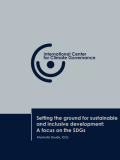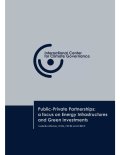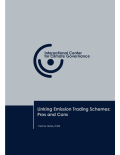
The United Nations summit, aimed at adopting the development agenda for the next fifteen years, took place from September 25 to 27. The meeting, held at the UN headquarters in New York, saw around 140 heads of state and government discuss and approve the new set of Sustainable Development Goals (SDGs), which will replace the Millennium Development Goals (MDGs) due to expire at the end of this year. By promoting sustainable and inclusive development, SDGs are the expression of a new vision of development able to foster economic goals while addressing the major societal and environmental challenges of our time. Besides the words, however, the real challenge will be implementation.

Development of industry in Zimbabwe has been widely acknowledged as one of the leading sources of current environmental and energy efficiency challenges affecting the country. Several challenges exist that affect widespread adoption of energy efficient technologies including implementation of policy framework for energy efficiency, ageing equipment, inadequate funding mechanisms, limited information, few economic incentives for SMEs to invest in energy efficiency, low technical capability of SMEs to implement energy efficiency, limited institutional sustainability of agencies involved in promotion of energy efficiency, and low uptake of energy management standards.

The global economy produces energy from two sources: a polluting non-renewable resource and a renewable resource. Transforming crude energy into ready-to-use energy services requires costly processes and more efficient energy transformation rates are more costly to achieve. Renewable energy is in competition with food production for land acreage but the food productivity rate of land can also be improved at some cost. The exploitation of non-renewable energy releases polluting emissions in the atmosphere. To avoid catastrophic climate damages, the pollution stock is mandated to stay below a given cap. In the interesting case where the economy would be constrained by the carbon cap at least temporarily, we show the following. When the economy is not constrained by the cap, the efficiency rates of energy transformation increase steadily until the transition toward the ultimate green economy; when renewable energy is exploited, its land acreage rises at the expense of food production; food productivity increases together with the land rent but food production drops; the prices of useful energy and food increase and renewables substitute for non-renewable energy.

Economic recession has limited national budget spending and the lending capacities of commercial banks for the realization of infrastructure projects in the field of energy generation, transmission and distribution.
This article highlights the potential of Private Public Partnerships (PPPs) for accessing finance and reducing capital expenditure (capex costs) of energy infrastructure projects in this current time of shrinking financial resources, which have widened the gap between public and private funding. The article points out that through PPP, the private and public sectors can reach a mutually beneficial agreement: the private sector can have the guarantees it needs to face risks entailed in the time gap between the project’s planning phase and its actual implementation, whereas the public sector can obtain capital investment and management expertise.

Linking emissions trading schemes is the bottom-up approach to creating a global carbon market. It entails political compromise and a careful assessment of the trade-off between its advantages and disadvantage.
This article points out that the main benefits of linking are the reduction of the aggregate compliance and transactions costs, the reduction of the competitive distortions and the increase of market liquidity. On the other hand, the article identifies also drawbacks in this process: differences in certain design elements can challenge the environmental policy objectives through free-riding and emissions leakage. For all these reasons, a linking project requires solutions to harmonize those design elements which pose barriers to an effective linkage.
